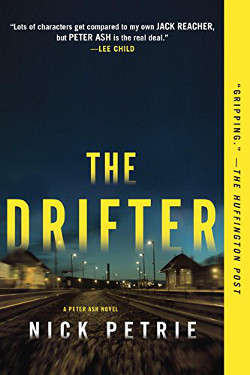
The Drifter by Nicholas Petrie is an explosive thriller debut that introduces Peter Ash, a veteran who finds that the demons of war aren’t easily left behind. It's nominated for an Edgar Award for Best First Novel.
When Peter Ash returns home from war, he just wants everything to be normal. But it isn’t. Every time he tries to enter an enclosed space—a house, an office—he hears “white static.” If he remains indoors too long, his shoulders begin to cramp and breathing becomes difficult; it feels like he’s catching the flu. So instead of trying to fit into an urban society, Peter strikes out into the wilderness. He sleeps under the stars, hunts his own food, and lets the world go on turning.
Until a park ranger finds him to tell him that best friend and fellow Marine James Johnson is dead. Peter packs up his things and heads back into civilization to help Jimmy’s widow, Dinah. His first task is to repair the sagging front porch. Amid the rotting cardboard boxes and detritus, Peter finds his first surprise: a huge, stinking, ugly dog who wants to eat him.
After that, he finds the suitcase. In the suitcase is cash. And explosives.
The Drifter, the Edgar-nominated debut novel by Nicholas Petrie, is kinda like its own plot: begins quietly, like the everyday task of fixing a porch; becomes more intense, like finding a mangy, violent dog beneath that porch; becomes even more intense, like finding a suitcase filled with obviously illegal items that can also kill you; and after that … well, the intensity just continues to go up from there.
Petrie has a knack for building tension in a scene (useful for a mystery author). He introduces his relatable and likable main character, Peter—who we understand suffers from a claustrophobic form of PTSD—and then puts Peter down under a dirty, dark porch with a giant dog. Petrie’s details are spot-on for creating a muscle-clenching sense of suspense.
It was dark and musty under the porch, the smell of weeds and forgotten things, with an animal stink on top. Not a dog smell, but something wilder. Something feral. The smell of the monsters in the oldest of fairy tales, the ones where the monsters sometimes won.
Narrow bars of late-autumn sunshine slanted through the gaps and made it hard to read the space. The dim yellow pool cast by his trouble light wasn’t much help. The debris pile in the back corner looked more substantial from this vantage point. There was all kinds of crap in there. Carpet scraps, boxes, old lumber. The splintered bones of missing mailmen.
The growl might have come from anywhere. It seems to vibrate up through the soil. Peter’s little piece of handrail and a few thin ropes didn’t seem like much. It would be smart to beat a tactical retreat, get the hell out of there, and return with a shotgun or a grenade launcher.
But he didn’t.
He kept moving forward on his elbows and knees, white sparks flaring high. Stick in one hand, light in the other. Alive, alive. I am alive.
This early sequence is reflective of the tension building throughout this Edgar-nominated novel. Much of the success of the suspense comes from the way Petrie gives characters distinct personalities. Peter, who we’ve already seen behave heroically despite his difficulties, is a man who’s left civilization; he lives off the land—this makes him a strange one in our urban worlds. Yet, he’s still willing to come out and help his friend’s widow and drive a truck and befriend a mangy dog (small spoiler).
But Petrie’s attention to character detail isn’t limited to his main man. Even the dog is something special. Jimmy Johnson, his dead Marine Corps friend, had plenty to hide. Even absent from the page, he makes an impact. And Dinah, Jimmy’s widow, is very distinct:
In the picture with her kids, Dinah had seemed fragile, like fine china kept high on a shelf.
In person, she was anything but.
He knew she was an ER nurse, so he was expecting an air of calm competence. But he wasn’t prepared for how the green hospital scrubs showed her shape, or the way she carried herself, fluid, capable motion wither her head held high, her back straight as an iron rod.
So, put all these characters in a mix with hundreds of thousands of dollars and some plastic explosives and…
BOOM!
Got yourself a blast of a story. (Sorry, couldn’t help it.)
Nicholas Petrie’s Edgar nod is well-deserved for this tightly written debut. These are characters that’ll stick with readers. As each chapter moves us down a twistier and twistier road, it becomes obvious that no one and no thing is what it seems. But I’ll let Peter sum it up—after meeting a strange man who has an uncanny interest in Dinah’s sagging porch:
The man hadn’t told Peter much. But Peter had learned a few things anyway.
A man with a gun was watching the house.
A man who knew about the money. Probably knew about the plastic explosive. But didn’t know where they might be.
And the dog didn’t like him.
It would be interesting to see where this thing went next.
To learn more or order a copy, visit:
Jenny Maloney is a reader and writer in Colorado. Her short stories have appeared or are forthcoming in 42 Magazine, Shimmer, Skive, and others. She blogs about writing at Notes from Under Ground. If you like to talk books, reading, publishing, movies, or writing, feel free to follow her on Twitter: @JennyEMaloney.
Read all posts by Jenny Maloney for Criminal Element.

If appointing Potter represents a gamble for Chelsea because he will be under pressure and scrutiny he has never experienced before, then the same will apply to the latest inhabitant of the Premier League’s hottest seat.